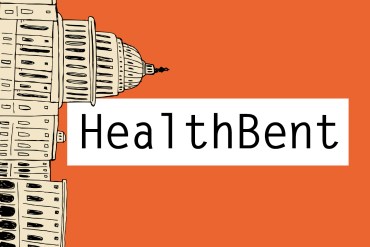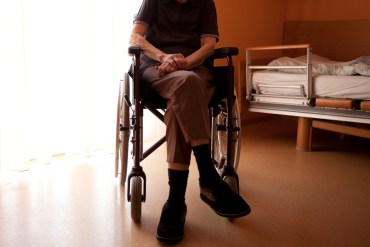Médicos dicen que los adultos mayores con COVID-19 presentan síntomas inusuales
Los adultos mayores, el grupo de edad de alto riesgo de sufrir complicaciones graves o morir por esta condición, podrían no mostrar ninguno de estos síntomas.
‘I Wasn’t Eating’: Senior Twin Sisters Battle Pandemic Anxiety Together
Twins Edna Mayes and Ethel Sylvester, 92, are relying on each other through the pandemic, in which one of the hidden dangers is to their mental health.
In Shutting Out Threat, Seniors In Continuing Care Communities Feel Shut In
For older adults in retirement communities ― a population especially vulnerable to COVID-19 — striking a balance between reducing the risk of contracting the coronavirus and maintaining the quality of life is a new frontier.
Biden’s Incremental Medicare Play For Bernie’s Backers
The presumptive Democratic presidential candidate unveils a proposal to lower the eligibility age for Medicare from 65 to 60.
What Does Recovery From COVID-19 Look Like? It Depends. A Pulmonologist Explains.
Reports offer a glimmer of hope, especially for older adults.
COVID-19 Crisis Threatens Beleaguered Assisted Living Industry
The Capital Senior Living chain of assisted living communities and others like it were struggling financially before coronavirus suddenly appeared. Now their situation is really getting tough.
Retiree-Rich Palm Beach County Leads Florida In COVID-19 Deaths
The coronavirus death toll in Palm Beach County — home to President Donald Trump’s palatial home and club, Mar-a-Lago ― is the highest in Florida, where the large senior population is at risk.
Nursing Homes Have Thousands Of Ventilators That Hospitals Desperately Need
The prospect raises a grim dilemma: Should doctors take people off life support in order to save COVID-19 patients who might recover?
Inside Meals On Wheels’ Struggle To Keep Older Americans Fed During A Pandemic
Its older volunteers are staying home and its clients, mostly age 75 and up, are more vulnerable than ever.
‘Staying Away From Grandma’ Isn’t An Option In Multigenerational Homes
About 1 in 5 U.S. residents live in multigenerational households. Many of those have three or more generations all under one roof. While the living arrangement has financial and emotional benefits, those families face a unique set of challenges as COVID-19 continues to spread.
Sheltered At Home, Families Broach End-Of-Life Planning
Barbara Dreyfuss died March 1 after contracting COVID-19 at a Seattle-area nursing home. Her earlier decision to document her final wishes may offer an example for families as the deadly virus spurs interest in end-of-life care.
Should You Bring Mom Home From Assisted Living During The Pandemic?
Families are weighing the challenges of providing home care with the isolation or potential danger of leaving folks in senior housing or long-term care.
¿Deberías sacar a tus padres de hogares y llevarlos a tu casa durante la pandemia?
Las familias se enfrentan a ese dilema. En los hogares de vida asistida los adultos mayores tienen alimentos y cuidado médico. En la casa tienen el amor de la familia.
Coronavirus Patients Caught In Conflict Between Hospital And Nursing Homes
Hospitals need to clear out patients who no longer need acute care. But nursing homes are alarmed at the prospect of taking patients who may have the coronavirus.
Federal Judge Rules Medicare Patients Can Challenge ‘Observation Care’ Status
Hundreds of thousands of people will be able to appeal hospitals’ decisions to classify them as “observation care” patients instead of inpatients, under a ruling last week in a class action suit.
‘Red Dawn Breaking Bad’: Officials Warned About Safety Gear Shortfall Early On, Emails Show
As President Donald Trump called the nation “in good shape” to handle COVID-19, a cache of emails released by officials in Washington state show that top public health authorities feared gear shortages and doctor safety in the early epicenter of sickness and deaths.
Escasez de cuidados paliativos provoca dolor extra a pacientes con coronavirus
A algunos expertos les preocupa que la escasez de estos profesionales pueda dejar a muchos pacientes de COVID-19 en estado grave en una situación de angustia.
Shortfall Of Comfort Care Signals Undue Suffering For Coronavirus Patients
Families worry that overwhelmed hospitals won’t be able to provide palliative care for loved ones stricken with COVID-19.
Does Everyone Over 60 Need To Take The Same Coronavirus Precautions?
Just how careful should older people be? Here’s what geriatricians think is reasonable.
Coronavirus: ¿todos los mayores de 60 años necesitan tomar las mismas precauciones?
¿Son necesarias las precauciones como las que respaldan los CDC para todos los adultos mayores?, ¿Incluso en áreas donde el nuevo coronavirus todavía no parece estar circulando ampliamente?
























